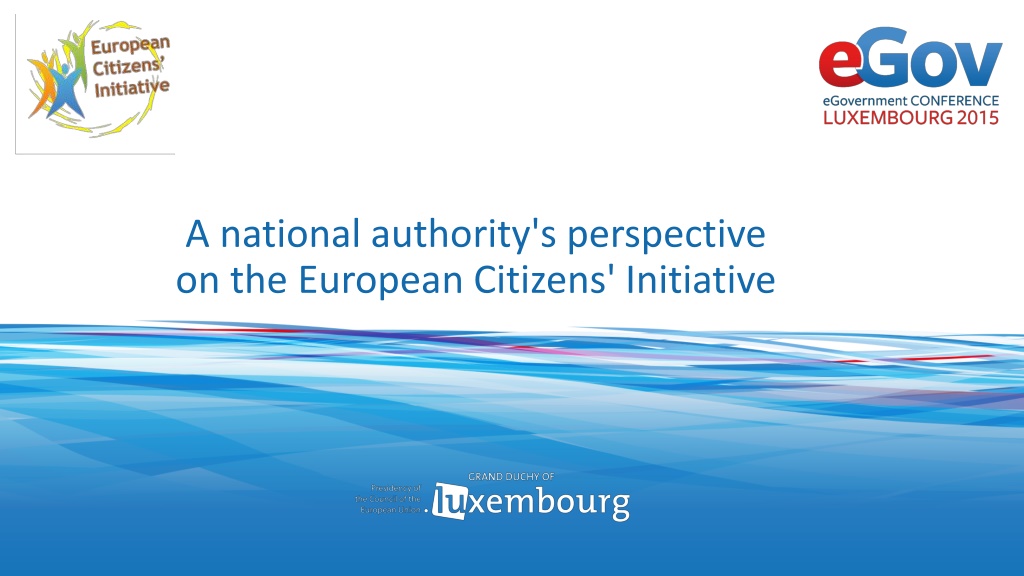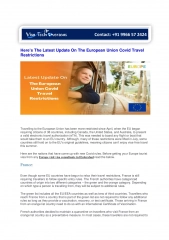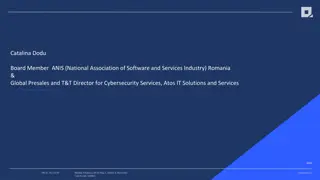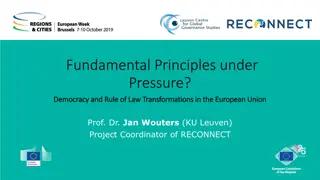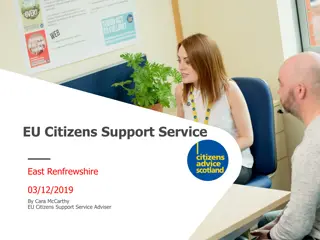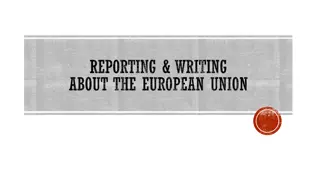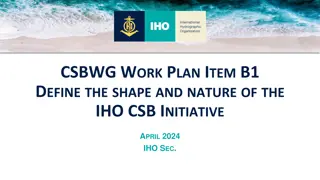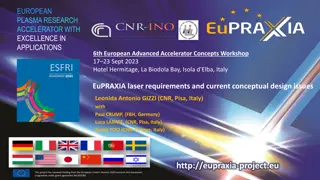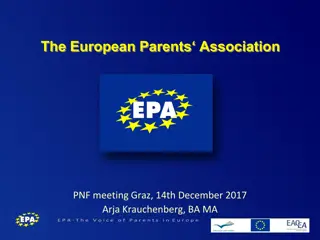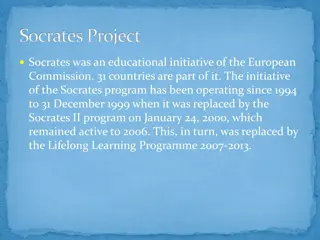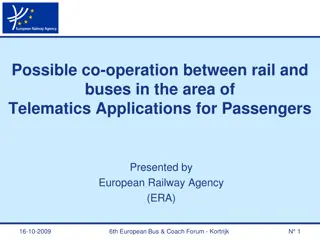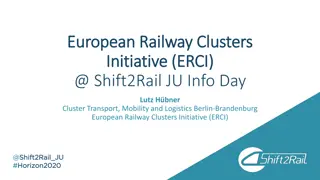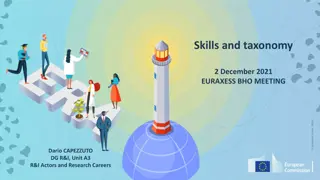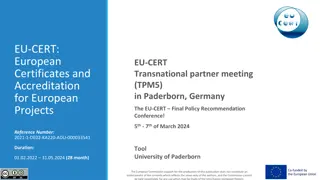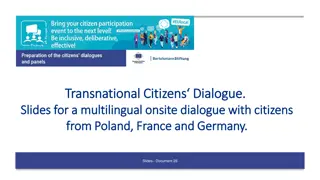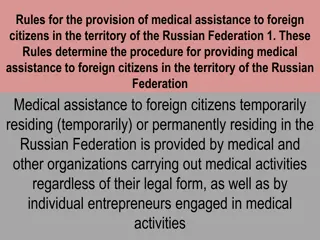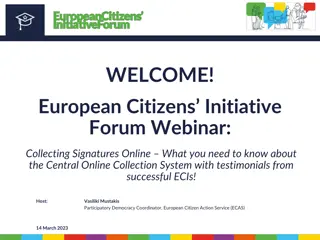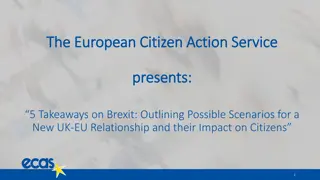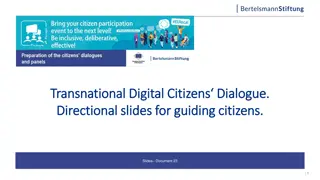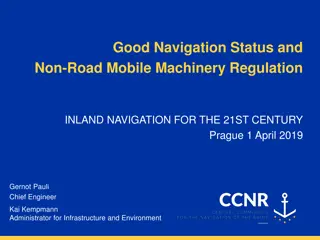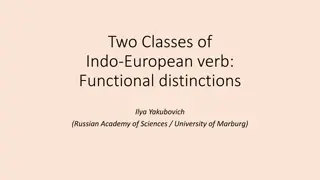Understanding the European Citizens' Initiative Process
The European Citizens' Initiative (ECI) allows citizens to propose legislation to the European Commission, operating under regulations introduced with the Treaty of Lisbon. This process involves collecting 1 million signatures within a year from at least 7 Member States. The roles of different actors, challenges faced, and tools used in the certification and validation stages are highlighted.
Uploaded on Oct 03, 2024 | 0 Views
Download Presentation

Please find below an Image/Link to download the presentation.
The content on the website is provided AS IS for your information and personal use only. It may not be sold, licensed, or shared on other websites without obtaining consent from the author. Download presentation by click this link. If you encounter any issues during the download, it is possible that the publisher has removed the file from their server.
E N D
Presentation Transcript
A national authority's perspective on the European Citizens' Initiative
Agenda Overview and state of play 4 proposals to improve the ECI 2
Agenda Overview and state of play 4 proposals to improve the ECI 2
What is an ECI ? The European Citizens' Initiative (ECI) is an invitation to the European Commission to propose legislation on matters where the EU has competence to legislate. was introduced with the Treaty of Lisbon and has been in force since April 1st 2012. is ruled by regulations (EU) 211/2011 and (EU) 1179/2011. Formal response from the Commission + Public hearing at the European Parliament 1 million signatures 1 year 7 Member States 3
Process Source: "Guide to the European citizens initiative" 4
Actors Citizens: Organisers and signatories EU Commission: SG (legal aspects, support, ECI Expert group) DIGIT (OCS, hosting, training, support) Europe Direct Contact Centre (support) Member States: National authority for certification National authority for validation ECI Expert group EESC: Translation, events NGOs: Support to organisers, improvement proposals 5
The hosting offer "During these early stages of what is, after all, the biggest ever experiment in transnational participatory democracy, the Commission is absolutely determined to make sure that organisers of the first ECIs face no insurmountable stumbling blocks. Since some organisers struggled to find suitable host providers on the market for collecting signatures online, the Commission will offer its own servers to them as a hosting environment." Commission Vice-President Maro ef ovi , 18/07/2012 But . the Commission servers are located in Luxembourg And (EU) 211/2011 requires the Luxembourgish national authority to certify all online collection systems hosted in Luxembourg So we have to evaluate each ECI hosted on the Commission's servers versus the requirements of (EU) 1179/2011. 7
Outcome Certification: (21) custom auditing tools smart ISO 27001 electronic template documents Linux Live CD for secure organiser environment Validation: (4) development of a new validation tool with: Automated validation versus national population registry Automated processing of paper statements of support (OCR) Detection of duplicates customisation for validation of national petitions 8
Current results 53 proposed ECIs Formal responses from the Commission Public hearings at the Parliament Some actions taken (Right2Water) No new legal act introduced 9
Agenda Overview and state of play 4 proposals to improve the ECI 10
Review period European Ombudsman's own-initiative inquiry (4 March 2015) European Commission's application report (31 March 2015) Latvian Presidency of the Council note (4 June 2015) Committee of Regions' opinion (13 October 2015) European Parliament's resolution (28 October 2015) Member States ? National authorities ? + Lots of legal studies, PhD thesis, NGOs publications, etc. 11
Proposals 1. Review the timeline of an ECI 12
Proposals 2. Review implementing regulation (EU) 1179/2011 Allow alternative approaches to the formal ISO/IEC 27k and SoGP while keeping a high level of security Review requirements on version and patch management Use a risk-based approach instead of detailed requirements Make it easier for organisers and hosting entities 13
Proposals 3. Offer a free centralised platform For organisers: free no need of IT/security experts Findings of Commission's ICT study : most overall cost effective approach satisfaction of organisers with EC hosting and support Let the organizers focus on their campaign 14
Proposals 4. Develop synergies with eIDAS eIDAS regulation covers both online authentication and electronic signature Some tools already exist (TSL, DS-DSS, ECAS) Let's not reinvent a (broken) wheel 15
Conclusion 3 questions about ECI Does it work ? What is the problem ? Should it be revised ? 16
Thank you Any question ? 17
